- Home
- Steven Brust
Jhegaala Page 4
Jhegaala Read online
Page 4
It was dark inside, a smoky, flickering lamp at either end making the pottery on shelves and plants on hangers jump and twitch. As I stood there, my eyes adjusting to the darkness, the flickering subsided.
The fellow in the shop was nothing like my grandfather. He had one of those faces that looked like someone had grabbed hold of the chin and pulled, with a high domed forehead and a receding hairline to increase the effect. He wore a sweat-stained singlet that had once been blue and loose pantaloons of brown. I couldn't guess his age within thirty years. He looked me up and down with pale brown eyes and an expression that reminded me of the guy I'd just been speaking with. It was obvious he didn't like me. Maybe it was the jhereg on my shoulders. Then again, maybe it was just me. I refrained from breaking his left kneecap and right instep. I didn't even think about it.
He dipped his head in a bow so perfunctory he could have taught Morrolan a few things about being rudely polite, and waited for me to say something. I finally settled on, "Have you any shaba-salt?"
"No," he said.
I paused, then decided on the direct approach. "What's the problem?"
"No problem," he said, tight-lipped. "I don't have any, that's all."
"Not that. Your attitude. What have I done to you? You don't like how I'm dressed or something?"
"You're a witch," he said.
Now, that I got to explain. "Witch" is the only way to translate it, but what he actually used was a Fenarian word, erdergbassor, that means, sort of, "witch who does nasty things to people," or maybe, "witch who studies things nice people don't talk about." Something like that. It was a word I knew, but not one I'd ever expected to hear directed at my sweet, lovable self.
I spoke to my familiar, who had picked up the translation from my mind. "Loiosh? Any ideas?"
"Color me stunned, Boss. Not a clue."
I drew a little circle on the counter with my finger, while looking at the merchant—I call him a merchant because I had trouble thinking of him as a witch. "I've never been called that before," I told him.
"Don't threaten me, young man. I'm a mem—"
"Member of the Guild," I said it with him. "Yeah. So, what is it that makes me a witch?" I asked him, using that same word.
He just glared at me. I wondered how long I could go without needing to hurt someone. It was odd: while surrounded by Dragaerans, I was never tempted to start messing with humans; but here, with no Dragaerans around, the idea didn't bother me a bit. In fact, it was getting more tempting by the minute. The last time I had been in this land, years before, I hadn't met all that many people, but those I'd met had been pleasant. I guess between that and the stories of my grandfather, I'd built it up in my head as some sort of paradise. Yeah, well.
"I'm serious," I said. "What makes you think—"
"Young man," he said, "either you are a fool, or you think I am. I know a familiar when I see one."
Oh. Well. So it was Loiosh after all. Who knew? But there were implications in there that hurt my head to think about. So I said, "All right. Do you know a family named
Merss?"
"The door is that way, young man."
And, once again, it was either walk out the door or use violence. I was sure I'd come up with some good remark to use on him tomorrow; meanwhile I pushed my way past the curtain and back into the street.
The next place was a shoemaker's, and the smell of leather and oils overpowered even the stench of the town. I'll spare you the details; the results were no better. These people just flat out didn't like me. I felt myself starting to get angry, and sat on the feeling; right now that wouldn't do any good. I needed to figure out what was going on.
"Three in a row, Boss. Convinced?"
"Yeah, only I'm not sure what I'm convinced of exactly."
He wasn't able to enlighten me, so I took us back to the inn, glancing at other shops as we walked, but not going in any. The shutters were open this time, and I concluded it must have to do with wind direction, Orbahn wasn't there when I arrived—in fact, I nearly had the place to myself—so I found a corner and a glass of strong red wine (actually, it looked more purple to me) and settled in to wait for him. The wine was decent.
After an hour or so I got a plate of lamb stew with leeks and garlic and a dollop of sour cream, and some thick-crusted bread. An hour after that Orbahn showed up. He didn't waste any time; he looked around, saw me, and came right over.
"And how has your day been?" he asked me, signaling to the barmaid.
"Interesting," I said. He ordered a drink, and I reminded him that I was buying lunch, so he got a bowl of the same stew I was having. "I'm not sure where to begin. Any idea why I might have been called an erdergbassor?"
His eyebrows climbed a little. "Hmmm. Who called you that?"
"The fellow that owns the witchcraft supply shop."
"Oh. Him." He shrugged. "I'll talk to him."
"No, no. Don't bother. I'm just curious. He seemed to think, either because my familiar is a jhereg, or because I have a familiar, that—"
"It's because your familiars are jhereg," he said. "A lot of people here think that means you follow the dark way, that those who follow the light have birds or cats, occasionally ferrets. Not reptiles."
"Oh. Odd."
"It is odd. It's a strictly local belief."
"This is a peculiar town."
He shrugged. "Just be careful here."
"Eh? What do you mean?"
"I mean, don't ask too many questions."
"Why? I came here to find some things out."
"I know. But, well, just be careful, all right? There are people here—"
"The Guild?"
He stopped in mid-sentence. "Ah," he said. "You've found out about that?"
"I've found out it exists, and that it isn't like any other guild I've ever heard of."
He rubbed his chin. "I was born here, you know."
"All right."
"And I need to do business here."
"I understand."
"If you get on the wrong side of the Guild, don't expect me to help you. Or even say hello when we pass on the street."
"All right. That's clear enough. But, until then, what can you tell me about it?"
He hesitated, then shrugged. "It's old, it's powerful."
"And all-inclusive? That is, no merchant is going to survive without being in the Guild?"
He nodded.
I said, "And this is strictly local?"
"Other towns have Guilds; most of them do. But this one is, ah, unique."
"How did it come about?"
"I don't know; it's been around as long as anyone can remember."
"Who is in charge?"
"There's a leader of the Guild. His name is Chayoor."
"Of course it is. Where does he live?"
"Why?"
"If I'm going to avoid trouble with the Guild, that would seem like the place to start."
He shook his head. "It's up to you, but I wouldn't. I think you ought to stay as far from it as you can."
I sipped my wine, wondering just how far I could trust this guy. Loiosh sort of shifted on my shoulder; he was wondering too. I decided not very far, for now. I don't trust people easily. I guess that surprises you.
"All right," I said. "I'll keep that in mind. I really just want to find my family, if there are any still here. Then I plan to move on. There isn't a lot for me in this town."
He nodded. "I had no luck with that," he said. "Wish I could help you."
"Thanks for trying."
He nodded. "I think this town isn't good for you. I don't mean that as a threat," he said quickly, I guess seeing some look on my face. "I have nothing against you. It's just a warning. If you keep poking around, it's going to get less comfortable. I'm sort of outside of things, I'm not involved as much as a lot of others because I travel so much. I don't have to be as, well, protective of the interests of the town. But I'm still part of it, know what I mean?"
"In fact," I said,
"I haven't the least idea. But I'm curious."
"Mmm," he said. He drank about half of his glass, showing no more expression than if it had been water, and looked thoughtful. "I guess what I'm saying is that I can warn you, but if you get into trouble, I can't protect you."
"Oh," I said. "All right. Fair enough. I've only spoken to merchants, so far. I trust the common folk are not in the Guild. I'll ask among them later."
He shook his head. "You'll do as you wish, of course. But I think it would be a mistake."
"You think the Guild will notice?"
"Unless you're pretty careful. And you do stand out here, you know."
There was something amusing about the idea that I, a human, could blend into a crowd of Dragaerans without being seen, but here, among my own people, I stood out. Still, he was probably right.
"Why are you helping me?" I asked him. Sometimes a blunt question can shock someone into an honest answer.
He shrugged. "You seem an all-right fellow. If you saw a stranger going for a stroll in a direction where you knew there was a nasty bog, wouldn't you mention it?"
Probably not. "I suppose so," I said.
"Well, Loiosh? What do you think?"
"Boss?"
"Is he warning me away for my own good, or because he doesn't want me learning something?"
"How should I know? Could be both."
"Mmmm. Good point."
"Can I buy you another drink?" I asked him.
"No, I'm fine. I need to be running anyway. I need to make sure the people preparing my next shipment aren't lightening the burden by drinking it all." He grinned and stood up.
"Okay," I said. "Thanks for the information, and the advice. I owe you." Exactly what I owed him was still to be determined. He made a dismissing gesture and walked out of the inn. I sat there for a while, watching my fingers draw circles in the moisture on the table.
One thing just wouldn't leave my head: When I had asked the tradesman if he knew anyone named Merss, he had thought I was threatening him. That was just too intriguing to pass up. Sitting and thinking about it would tell me nothing.
Presently I got up and went out.
3
Magistrate: What first brought him to your attention?
Lefitt: His remark about starting the healing process.
Boraan: When those in power wish to start the healing process, my lord, it means there are things they don't want you to find out.
Lefitt (hastily): Present company excepted, of course!
Boraan: Oh yes, to be sure.
Lefitt: May we offer Your Lordship oishka and water?
—Miersen, Six Parts Water Day Two, Act IV, Scene 5
The smell wasn't as bad. There was a wind from the west and it was cold, too cold for mid-spring. I pulled my cloak around me and thought about going back to my room to get warmer stuff, but then I'd have to put up with remarks from Loiosh, and it didn't seem worth it.
"Boss?"
"Yeah?"
"What now?"
"Now I find someone who'll talk to me."
"So, you don't trust him?"
"Yes. No. I don't know. I need to know more. And, dammit, I want to find them."
"Why?"
"Loiosh—"
"No, Boss, really. When we came over the mountain, it was something to do since we were here anyway. Now it's become this thing you have to do. Why?"
Part of his job is asking me the hard questions.
While I was trying to think up a good answer, my feet carried me over to the pier. If you've lost track, it was the middle of the day. The factory across the river was belching gray smoke into the air. The wind was coming from the mountains (which I'm told is unusual) so at least the stench wasn't bad. People— not many, mostly mothers with children in arms—were walking along the streets behind me. I didn't worry about them, because Loiosh was—
"Someone's coming, Boss. Woman, doesn't seem threatening, and doesn't seem to be walking up to you in particular."
"Okay.”
I didn't turn around, and presently there were footfalls behind and to my right. Soft-soled shoes that quietly "swooshed," probably dark skin or something like it. I saw her out of the corner of my eye, about ten feet away, and turned and nodded. She nodded back. She was around my age, maybe a bit older. Her eyes, which I noticed first, were an intriguing gray; her hair was black, I suspected dyed, and fell in long ringlets well past her shoulders. Her nose was straight, her form very pleasant, curvy; some time in my past I'd have been interested, and that part of me must not have been completely dead or I'd not have noticed. She wore long silvery ear-rings and several rings on her fingers. Her dress was forest green, with a low, square neckline, and large obvious ties down the front; it didn't quite reach her ankles and the red ruffle of her flaisl* was just visible below the hem. She wore slippers the same color as her eyes.
I turned back to studying the smoke from the factory. She seemed to be doing the same. After a few minutes she said, "Looking for a little fun?"
"No thanks," I said. "I hate fun. Never wanted any. Even as a child, I'd run and hide if it looked like someone wanted me to have fun. I was pleased to grow up, because now I can go through the rest of my life without ever having fun."
She laughed perfunctorily then gave a sort of sigh and continued watching the factory. I figured her work-day would likely begin when the place closed for the evening.
"Is the Guild in charge of your profession too?" I asked her.
You never know how tags will react to questions about their work. Sometimes they'll talk about it the way you'd talk about the prospective harvest if the frost didn't come early; sometimes they'd give a sort of haughty glance as if figuring you were getting excited by asking; sometimes they'd become angry as if any question about how they made their daily bread was more personal than the act itself—which I guess maybe it was.
She just said, "The Guild runs everything."
"I was getting that impression. I'm Vlad."
She looked at me, then looked back across the river. "Well met, Vlad. I'm Tereza. What in the name of the Three Sisters would bring you to this crappy little town?"
There were lines in the corners of her eyes and on her forehead that she hadn't quite managed to conceal with her makeup, but I guess the makeup wasn't expected to function in full light. The lines made her more attractive.
*A flaisl, it turns out, is a warm, abstract-pattern fabric used by prairie prostitutes for colorful yet comfortable petticoats during the cold winters. Thanks to K. Christie for finding that out for me.—SB
"I came for the aroma."
A smile flickered quickly.
"In fact," I went on, "I've been standing here asking myself the same question. Mostly, I'm passing through on the way to somewhere else. Or I guess from somewhere else. But I understand I have kin somewhere around here, and I'd like to find them."
"Oh. Who?"
"The name is Merss."
She turned her head and gave me a long, measuring look. I waited.
"I can't help you," she said at last.
I nodded. "I'm beginning to suspect they aren't here at all," I said, because a good lie can loosen tongues better than a bad truth.
"I know who would be will—that is, able to tell you many things about this town," she said.
"Oh? Well, that's the most hopeful thing I've heard today."
She hesitated, then said, "It'll cost you."
I looked at her.
She sighed. "Oh, all right. There's a public house called the Cellar Mouse."
"Yes, I saw it."
"In back of it are stables. Most nights, there will be a man there named Zollie. He's the coachman for Count Saekeresh. He knows everyone and everything, and he's the Lord's coachman so no one can touch him; or at least so he thinks. Get him liquored up a bit and he'll tell you anything."
I dug an imperial out, walked over and put it into her palm. She did that thing people do when judging the weight of a coin and sai
d, "Is it gold?"
"Pure. Don't spend it all in one place."
She laughed. "I owe you, Vlad. Fenario, here I come!" She grinned and kissed my cheek. She was nearly as tall as I was. She was much more attractive when she was smiling. I watched as she walked away, a nice spring in her step.
After a bit, I took myself over to the Cellar Mouse, which was a lot like the Pointy Hat (as I'd started calling the other place in my head) except the room was longer and the ceiling a bit higher. The tables were all small and round. After the usual reserved but not-unfriendly nods, I took a glass of wine to a small table and set in to nursing it until the evening.
The place started filling up quickly as dark came, mostly with men who had both the look and the smell of the factory across the river. There were also a few girls, all of whom wore gowns with obvious ties down the front and ankles uncovered. Sometimes one would leave with a workman, heading into the back. A couple of them looked at me, but none came over.
I studied the people, for lack of anything else to do, and worked on memorizing the faces for no reason except that it's good practice. Eventually, I made my way out the door and around back. The stable was directly to the rear about fifty feet, and, from what I could see, connected to a sort of paddock. Outside of it was a tall coach, and even in the dim light that leaked out of the inn it seemed to glisten. There was a marking of some sort on the door, and no horses were attached. Where there was a coach, there would be a coachman. And where there's a coachman, there are stories. And where there are stories, there are answers to questions, and maybe even the right ones.
I went in.
It smelled of fresh hay, old hay, wet hay, moldy hay, and manure. It was a big improvement. There were ten stalls, four of which were occupied by horses of various colors and sizes, the fifth by a skinny fellow wearing black, with a high-domed forehead over thick brows, making him look, well, a bit ridiculous. His hands were folded over his stomach, and there were several odd white scars crisscrossing the backs of them. He sat on a low stool, and his eyes were closed, but opened as I came closer; I saw no trace of sleep in them, nor sign of drunkenness—the latter being unusual, if you believe all you've heard about coachmen.

 Phoenix
Phoenix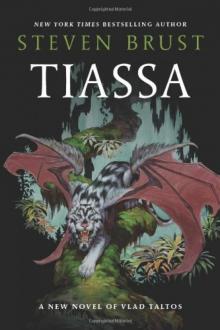 Tiassa
Tiassa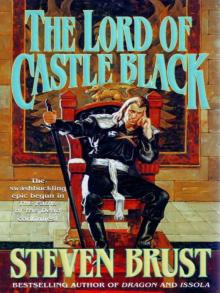 The Lord of Castle Black
The Lord of Castle Black To Reign in Hell: A Novel
To Reign in Hell: A Novel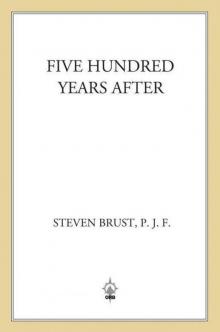 Five Hundred Years After (Phoenix Guards)
Five Hundred Years After (Phoenix Guards)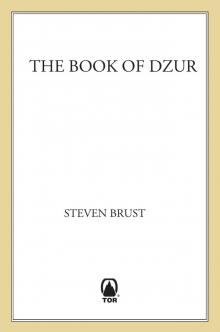 The Book of Dzur: Dzur ; Jhegaala
The Book of Dzur: Dzur ; Jhegaala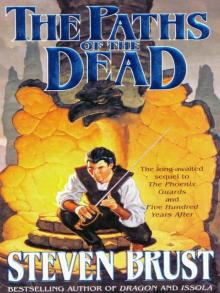 The Paths of the Dead
The Paths of the Dead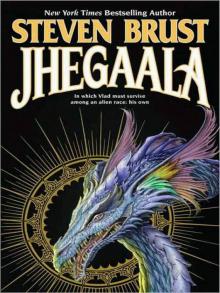 Jhegaala
Jhegaala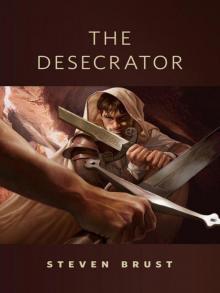 The Desecrator: A Tor.com Original
The Desecrator: A Tor.com Original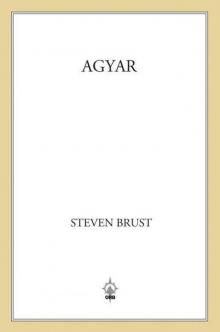 Agyar
Agyar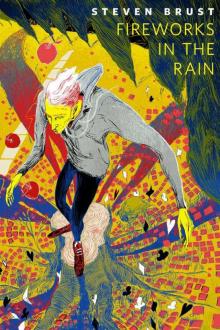 Fireworks in the Rain
Fireworks in the Rain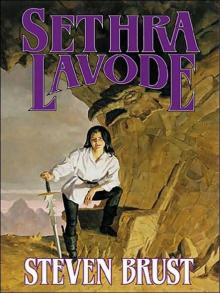 Sethra Lavode
Sethra Lavode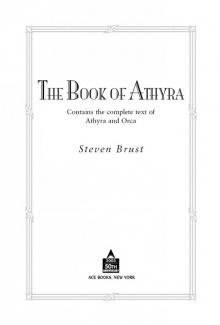 The Book of Athyra
The Book of Athyra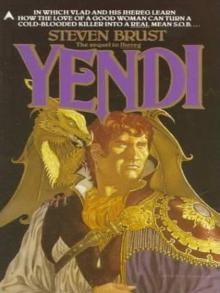 Yendi
Yendi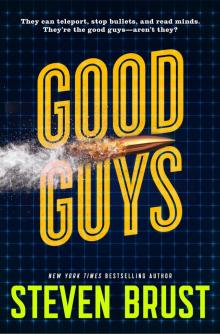 Good Guys
Good Guys The Book of Jhereg
The Book of Jhereg Cowboy Feng's Space Bar and Grille
Cowboy Feng's Space Bar and Grille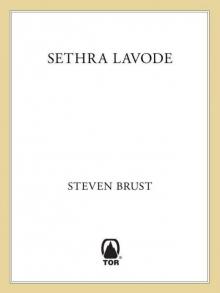 Sethra Lavode (Viscount of Adrilankha)
Sethra Lavode (Viscount of Adrilankha) My Own Kind of Freedom
My Own Kind of Freedom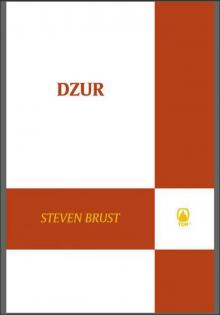 Dzur (Vlad Taltos)
Dzur (Vlad Taltos) The Lord of Castle Black: Book Two of the Viscount of Adrilankha
The Lord of Castle Black: Book Two of the Viscount of Adrilankha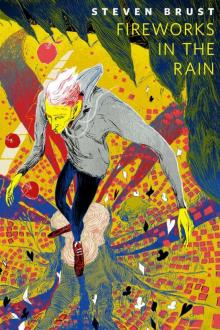 Fireworks in the Rain: A Tor.Com Original
Fireworks in the Rain: A Tor.Com Original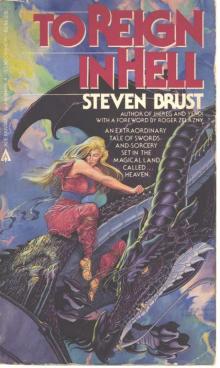 To Reign In Hell
To Reign In Hell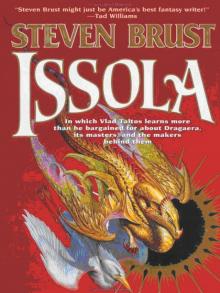 Issola
Issola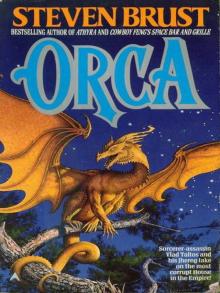 Orca
Orca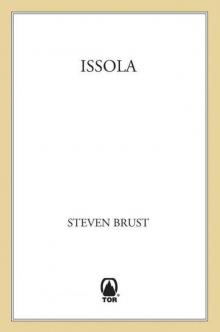 Issola (Vlad Taltos)
Issola (Vlad Taltos)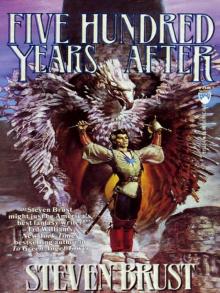 Five Hundred Years After
Five Hundred Years After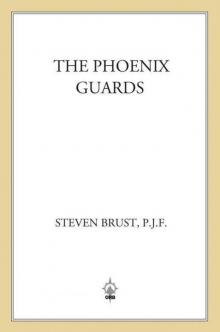 The Phoenix Guards
The Phoenix Guards Taltos
Taltos![[Vlad Taltos 06] Athyra Read online](http://i1.bookreadfree.com/i1/03/24/[vlad_taltos_06]_athyra_preview.jpg) [Vlad Taltos 06] Athyra
[Vlad Taltos 06] Athyra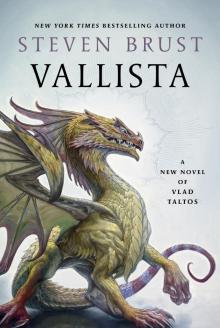 Vallista--A Novel of Vlad Taltos
Vallista--A Novel of Vlad Taltos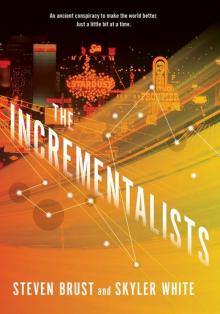 The Incrementalists
The Incrementalists![[Vlad Taltos 04] Taltos Read online](http://i1.bookreadfree.com/i/03/24/[vlad_taltos_04]_taltos_preview.jpg) [Vlad Taltos 04] Taltos
[Vlad Taltos 04] Taltos![[Vlad Taltos 03] Teckla (v 1.1) Read online](http://i1.bookreadfree.com/i1/03/27/[vlad_taltos_03]_teckla_v_1_1_preview.jpg) [Vlad Taltos 03] Teckla (v 1.1)
[Vlad Taltos 03] Teckla (v 1.1) The Book of Taltos
The Book of Taltos The Paths of the Dead (Viscount of Adrilankha)
The Paths of the Dead (Viscount of Adrilankha) Jhegaala (Vlad Taltos)
Jhegaala (Vlad Taltos)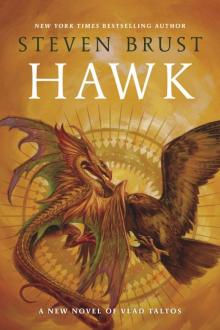 Hawk (Vlad)
Hawk (Vlad)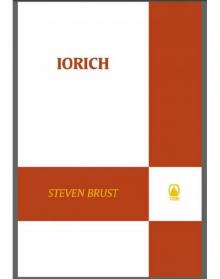 Iorich
Iorich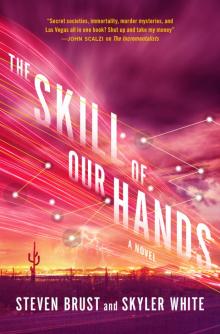 The Skill of Our Hands--A Novel
The Skill of Our Hands--A Novel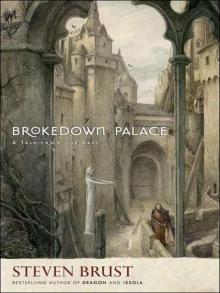 Brokedown Palace
Brokedown Palace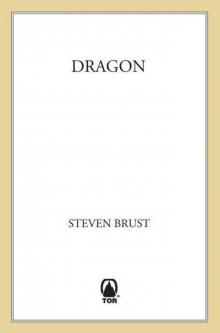 Dragon (Vlad Taltos)
Dragon (Vlad Taltos) Dragon
Dragon Athyra
Athyra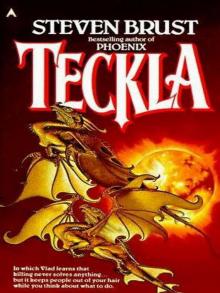 Teckla
Teckla Dzur
Dzur